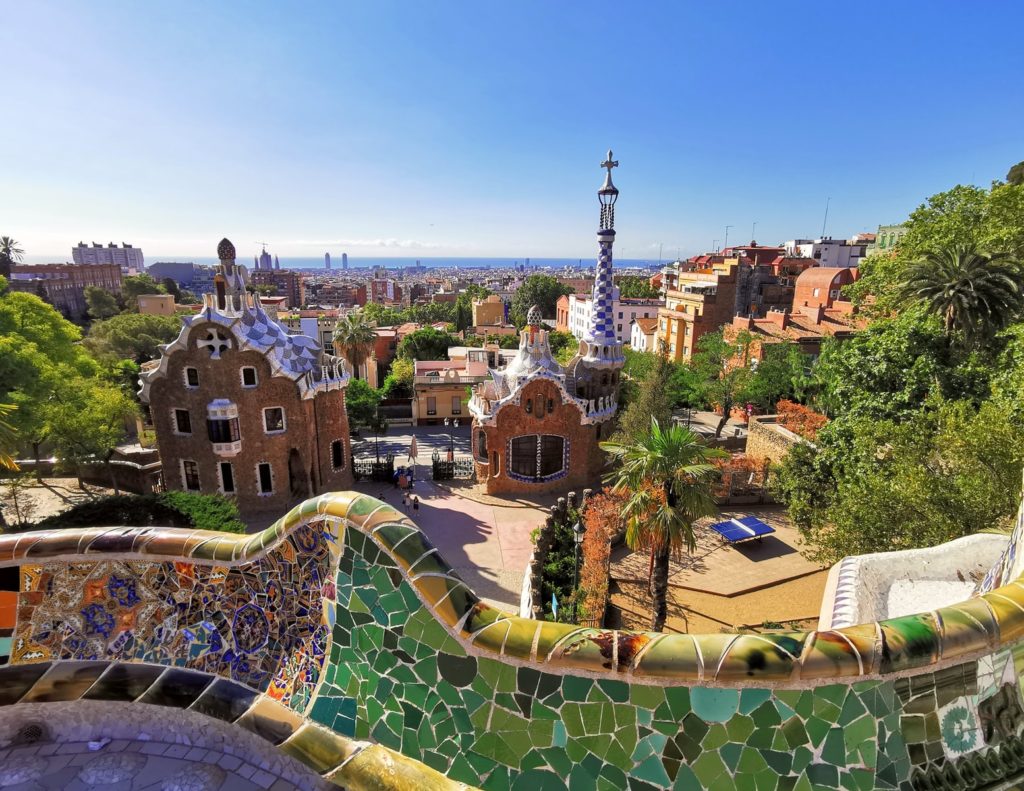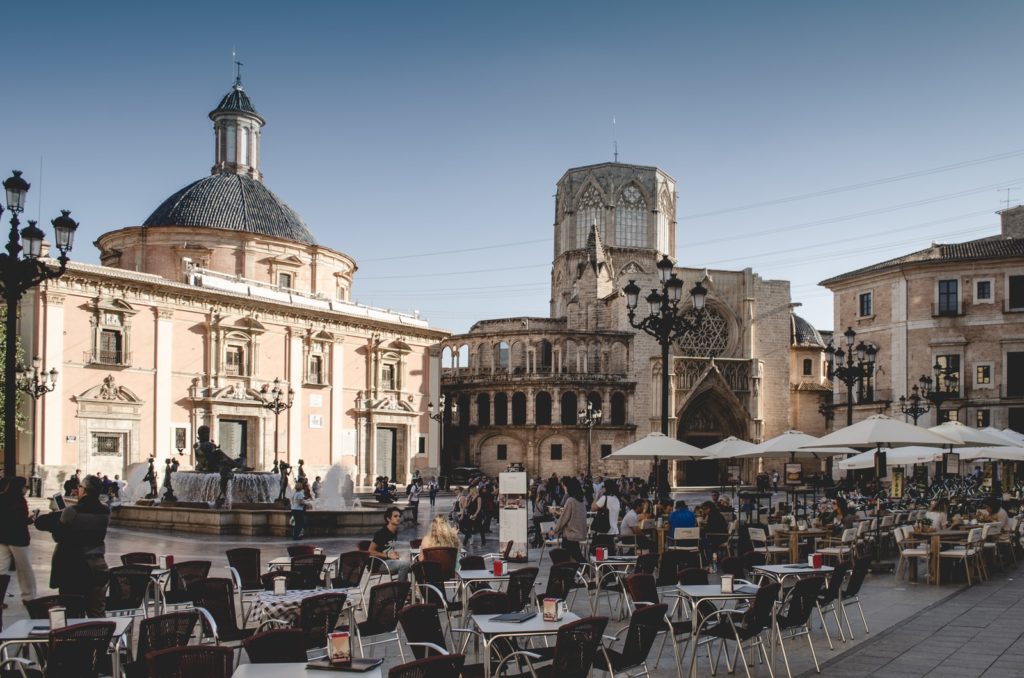What to know about Spain's proposed digital nomad visa
Because the remote working lifestyle is becoming much more popular and widespread, lots of nations are releasing (or already have released!) digital nomad visas.
Some of the most well-known currently-available options are the digital nomad visa schemes offered by Croatia, Estonia, and Hungary. And schemes like this are becoming way more commonplace and accessible across the planet—Indonesia recently proposed a lengthy 5-year digital nomad visa!
These visas allow remote workers to live and work abroad safely and legally, and lots of nations are allowing long-term visitors to take advantage of their perks.
Currently, the Spanish government is finalizing the details of their soon-to-be-released digital nomad visa… so if you want to work remotely in the alluring land of beautiful beaches, sunny weather and delicious paella , that’ll soon be a feasible option.
Because Spain is one of the best countries in Europe for remote workers, this is a pretty exciting prospect. So in this guide, we’ve brought you everything you need to know about Spain’s digital nomad visa—we’ve covered facts and figures on fees, documents, who can apply, how long it’s valid for, and plenty more.
But here’s a quick disclaimer… this scheme is only in the proposal stage for now, and some of the finer details haven’t yet been confirmed. But for now, this is everything we know (and everything you need to know!) about Spain’s digital nomad visa.
And here’s another disclaimer… if you’re from an EU/EEA country (or you’re Swiss) and/or have an EU/EEA/Swiss passport, you can move freely within the EU with basically no bureaucracy, making things much more simple and stress-free for you. Which means that you don’t need to (and can’t) apply for this visa. But we’ll come to all the details on that soon.
Anyway, strap yourself in for some tax breaks, warm weather, and lots of exciting new places to call home… here’s everything you could possibly want to know about Spain’s digital nomad visa!
Things to know about the digital nomad visa
If you’re a non-EU/EEA/Swiss citizen or non-EU/EEA/Swiss passport holder, this proposed Spanish digital nomad visa will allow you to live in Spain while working remotely.
It will be open to foreign workers who are self-employed, or employed by non-Spanish companies.
The official launch date isn’t yet clear… but given the nation’s eagerness to welcome digital nomads to its borders, it shouldn’t be too much longer. Some sources claim that the scheme might be officially launched in September 2022, but that seems to be pretty speculative.
The process of officially releasing the visa is in progress, via the so-called Startup Act that was recently submitted to Spanish parliament. According to this document, this hopefully-soon-to-be-accepted draft law “contains important measures to attract international talent […] encouraging the establishment of remote workers and digital nomads in Spain.”
That document includes lots of details about the way the visa will work (or, at least, the way the visa might work). And coming up, we’ve brought you the most important and interesting parts of it.

Who can apply for Spain’s digital nomad visa
If you’re from outside of the EU/EEA/Swiss region (and don’t have an EU/EEA/Swiss passport), you’re free to apply.
Assuming you’re already an experienced digital nomad with a proven and reliable source of long-term income, you have a good chance of having your application accepted.
But before you get too excited, you’ll need to fulfill some requirements, which brings us to…

Spain’s digital nomad visa: documents required and processing fees
For now, we’re still not entirely sure about the documents you’ll need, or the fees you’ll be required to pay—but when nations roll out these types of visas, applicants typically need to provide the following documents and evidence:
- Proof of constant income: the amount varies hugely from country to country, but you’ll need to prove how much you earn, via bank statements or invoices. Usually, this figure lies somewhere between $1,000 and $3,000 per month. For the Croatia digital nomad visa, for example, you need to prove you have a monthly income of around $2,500.
- Passport and visa application: obviously! You’ll need a valid travel document (valid likely for at least one year), along with a fully-finished and accurately-completed application form. These application forms are usually relatively brief.
- Criminal record check: some nations require a background check, to prove that you’re trustworthy, reliable, and not a notorious bank robber.
- Health insurance or travel insurance: this isn’t always a necessary requirement, but some countries ask that you have some form of insurance plan. Because Spain is a developed country, it’s very likely this requirement will be part of the application process.
- Proof that you have somewhere to live: this can typically be a long-term place, or a short-term place. If you need a short-term place to use as your temporary application address, a rented apartment or a serviced apartment is a convenient and comfy solution.
It’s likely that you’ll need to have these documents translated into Spanish, by a professional translator (not just churned out brainlessly by a poorly-reviewed online app).
This might sound complicated, but it seems the Spanish government are keen to make this entire application a very easy process. According to the official Startup Act document, “the procedures for setting up a company are streamlined into just one step and can be completed online without notary or registry expenses”. Presumably, the application will be easy and inexpensive, and will require absolutely zero in-person meetings. Perfect!
We don’t yet know how much it’ll cost to apply for this visa… but it’s likely that it’ll be very affordable. The current cost of applying for Croatia’s digital nomad visa is around $60, while Estonia’s costs around $100. But it’s important to note that, if your application is rejected, you won’t get this money refunded… so make sure you do your application properly!

For how long is Spain’s digital nomad visa valid?
Again, we’re not 100% sure… and neither are the Spanish government (for now).
But the startup document states that the visa “is applicable to executives and […] digital nomads and their families, who are eligible for a special visa for up to 5 years.”
According to some sources, it seems likely that the visa will at first be valid for only one, after initial acceptance… and it’ll then be renewable for a further four years, assuming you still fulfill the requirements for the visa. That said, this speculation seems to have little basis in reality, so it might be possible that the initial acceptance will immediately grant you five years in the nation.
Either way, it seems that successful applicants for Spain’s digital nomad visa will probably be able to live in Spain for five whole years. Not bad!

Do digital nomads need to pay taxes in Spain?
Again, we’re not totally sure how this will work—different nations have different rules on how digital nomads are taxed (if at all!).
That said, some things are partway to becoming clear… and it looks pretty promising.
The draft law we keep mentioning claims, “Significant tax measures are introduced, such as a reduction in Corporate Tax and in Non-Resident Income Tax (which drops from 25% to 15%) for four years, as well as interests and deposit-free deferral of tax debt payments. “
The document also states, “Corporate Tax and Non-Resident Income Tax payments for the first two years in which taxable income is recorded may be deferred, without requiring any deposits or late payment interest, for a period of 12 and 6 months, respectively. And the obligation to make payment instalments on Corporate Tax and Non-Resident Income Tax is eliminated for the first 2 years after taxable income is first recorded.”
So although the wording is a little nebulous, it seems that those using Spain’s digital nomad visa might be eligible for some pretty convenient tax breaks… and that the first two years have a good chance of being completely tax-free.
All in all, it looks like anyone making use of Spain’s digital nomad visa is set for a pretty sweet financial deal… especially considering the nation is one of the most affordable countries in western Europe (and a lot more affordable than most people expect).

Alternative options to Spain’s digital nomad visa
Digital nomad visas are pretty unique, as they allow you to live and work in a nation without being employed by a body in that nation.
For that reason, there aren’t really any alternative visa options that will suit digital nomads and their lifestyle. But, that said, there are other visas available for people wanting to move to Spain—and depending on your age, circumstances and financial situation, they might be appealing to you.
The most well-known Spanish visa options are:
- The Spanish residence visa (also sometimes known as a ‘non-lucrative’ visa)
- The Spanish golden visa
The Spanish residence visa is a standard relocation visa, which entitles you to live in the nation for at least one year (but likely longer). That said, it’s a non-profit visa, which means you can’t take any form of paid work while you’re making use of it.
The golden visa is open to any non-EU/non-EEA resident who is willing and able to make a hefty contribution to the Spanish economy. Under the conditions of this visa, you can invest in Spanish property or a Spanish company, you can put money in a Spanish bank, you can start a new business in Spain, or you can buy some Spanish debt.
Depending on which golden visa option you choose, there are different minimum financial requirements… but the lowest contribution currently sits at a pretty big €500,000.
We’ve covered both of these visas in detail (along with much more stuff) in our guide to everything you need to know about retiring in Spain. So check that out for your other Spanish relocation alternatives.
Other options include an au pair visa, a standard work visa, and a student visa. But because you’re a digital nomad with a pre-existing remotely-sourced income, it’s unlikely that any of those will appeal to you.

What if I have an EU passport? Can I still apply for Spain’s digital nomad visa?
If you have an EU passport, you can’t apply for the Spain digital nomad visa. That’s because you have freedom of movement throughout the EU, and you’re already able to live and work in Spain without the need for much bureaucracy or hassle.
If you’re lucky enough to have an EU/EEA/Swiss passport, you have the right to live and work in Spain without a Spanish visa.
That said, if you’re going to be in Spain for more than three months, you’ll need to officially register your residence.
To do so, you need to visit your local Foreigners’ Office (or police station). Take your passport, and some proof that you can financially support yourself (and any people you’re living with). If everything goes to plan, you’ll then get your residence certificate and your ‘Foreigner’s Identity Number’ (NIE). And you can then stay in Spain as long as you choose!
Of course, if you’re from the UK, Brexit has removed your right to free movement, so you need to follow the same rules and regulations as any other non-EU citizen. Here’s everything you need to know about moving from the UK to Spain after Brexit.
Finding a place to live in Spain
As a digital nomad, you probably don’t yet know how long you’re going to live in Spain… or where exactly in the country you want to live.
But until you have a long-term place to live, you want a comfy base to live in (and, as a digital nomad, to work in!). The easiest option for now is a furnished apartment or flat. If that’s what you’re looking for, we have various options on our site, across many towns and cities in Spain. They’re all comfy, affordable, homely, and ready to move into right away.
Other good options for finding a long-term place to stay include Idealista (which compiles properties from many real estate agents but they may or may not be furnished), and good ol’ reliable Facebook (which has an almost-endless number of Spanish real estate groups).
No matter how and where you find your place to live, Spanish apartments and homes are pretty inexpensive by typical western European standards. At the time of writing, here are the types of costs you can expect to encounter:
- 1-bedroom furnished apartment in a city center: around $734
- 1-bedroom furnished outside of a city center: around $601
- 3-bedroom furnished in a city center: around $1,228
- 3-bedroom furnished outside of a city center: around $925
Smaller cities are of course a little more affordable, while bigger cities are a little more expensive.
Serviced apartments and serviced flats are a little more pricey than the figures outlined above… but they’re much more convenient, they’re readily available, you have someone else to do your cleaning for you, and you don’t need to pay a deposit. Perfect when you’ve just relocated to a new nation!
What to know about healthcare in Spain
Spain has an excellent healthcare system. It’s routinely voted as one of the best in the world, it was ranked 19th in Europe back in 2008, and it’s also the world’s #1 spot for organ transplants.
That said, the healthcare is much better in big cities than it is in some of the more remote and rural parts of the nation. But because you’re probably not going to live in some tiny hard-to-access mountain town, that’s unlikely to be a concern to you.
Like many nations, Spain offers both private and public healthcare, but most Spanish citizens exclusively use the public healthcare system (which is funded via the payment of taxes).
Quite how Spain’s healthcare system will relate to Spain’s digital nomad visa is not quite clear.
Foreigners who officially live in Spain are entitled to free healthcare from the state (assuming they pay social security contributions)… but as we’ve already covered, proof of medical insurance or health insurance might be required as part of your application for Spain’s digital nomad visa. If that’s the case, your insurance will entitle you to private healthcare.
Whatever the case, you’ll be entitled to top-quality healthcare of some description… so when the final details are ironed out, you won’t be left without access to good hospitals and doctors.

Best places to be a digital nomad in Spain
This depends on who you are, how old you are, and what you’re looking for.
But if you successfully apply for Spain’s digital nomad visa, you have almost-endless options on where you might want to live. Some of the best and most popular picks include…
- Madrid: Spain’s capital is of course the natural first choice for anyone considering making use of Spain’s digital nomad visa. Home to excellent food, endless expats, a cosmopolitan culture, and non-stop nightlife, it’s perfect for people of all ages. Check out some Madrid apartments.
- Barcelona: possibly Spain’s most famous destination, Barcelona offers a massive amount of excellent stuff. Hip, edgy and creative, it’s unique and artistic, and offers an enticing combo of beaches, architecture, year-round events, and a young population. Check out apartments in Barcelona
- Tenerife: one of the most touristy parts of the nation, Tenerife isn’t part of mainland Spain. Instead, it sits on a tiny archipelago off the northwest coast of Africa. It offers a population of less than a million, constant sunny weather, and lots of outdoor adventures.
- Valencia: the third-biggest city in Spain, Valencia is in some ways like a budget Barcelona—and it’s rapidly becoming the nation’s next digital nomad hotspot. If you want to make many friends and live an affordable city-center life, it’s a great choice. Check out apartments in Valencia.
- Granada: if you like smaller cities, you’ll love this place. It has a population of around 250,000 people (with a surprising number of expats). Because it’s in the south of the nation, you get great year-round weather… along with lots of history, heritage and hiking.
- Malaga: another excellent coastal option, Malaga is pretty close to Granada, and it sits right on Spain’s southern shores. Here, you get 320 days of sunshine every year, easy access to lots of excellent beaches, and even close proximity to northern Africa! Check out some Malaga apartments.
- Ibiza: if you can’t get enough of non-stop parties, here’s where you want to be. The most famous nightlife spot in the nation, it’s perfect for young people, and you’ll always find somewhere to stay up late. Just don’t blame us if you’re perpetually hungover.
- Seville: the biggest settlement in Andalusia, Seville is cultural, quaint and cozy, and lots of people reckon it’s the prettiest city in Spain. It’s a bohemian city, but it offers lots of traditional touches—including great food, late-night flamenco, and lengthy siestas. See some apartments in Seville.
For even more information on all these potential new homes (and more!), here’s our fun-packed guide on all the best places to live in Spain… no matter who you are or which visa you’re making use of.
Spain’s Digital Nomad Visa: Final Words
And just like that, you’ve reached the end of our guide—that’s everything we know about Spain’s digital nomad visa (for now!).
Though the details haven’t yet been finalized, the nation’s digital nomad visa promises to be one of the most exciting of its type. According to all the details we know so far, it seems the visa will be lengthy, easy to access, financially appealing, and hassle-free. And it might enable you to live in Spain for up to five years!
As soon as we discover any more updates, we’ll make sure to pass them your way… so keep checking our Homelike blog for more!























